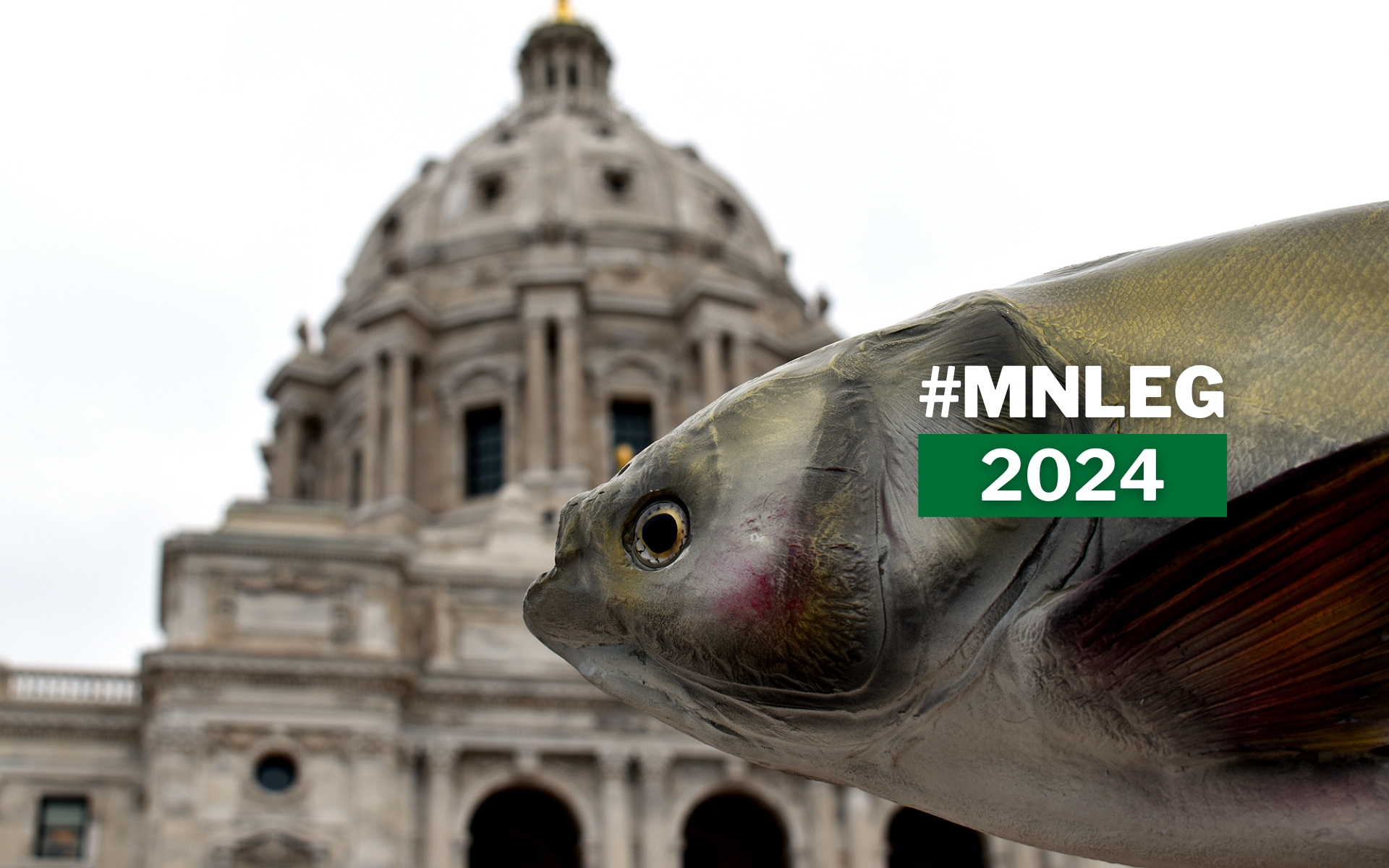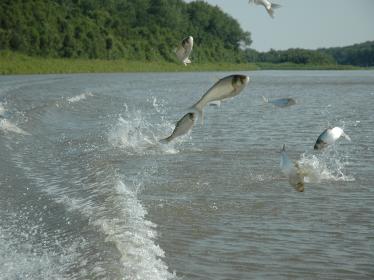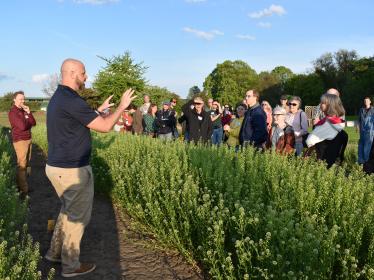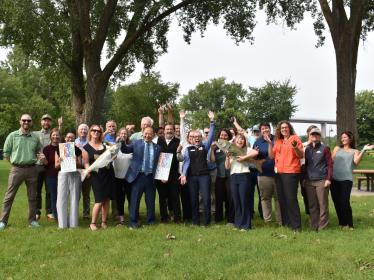Big win: MN Legislature funds invasive carp deterrent

Thank you to everyone who advocated to protect the Mississippi River! (Even this taxidermied invasive carp, who made a guest appearance at a House hearing.)
FMR and our Stop Carp Coalition partners are thrilled to share (and as you may have heard on MPR) the Minnesota Legislature approved $12 million for an invasive carp deterrent in the Mississippi River on March 13. This deterrent will be installed at Lock and Dam 5 just upstream of Winona, the last stop for invasive carp before they reach the Twin Cities metro area.
To say this legislative win was a team effort would be an understatement.
While FMR led the lobbying at the Capitol, we couldn’t have achieved this without the Stop Carp Coalition or the support of over one thousand FMR River Guardians who contacted lawmakers and participated in both virtual and in-person events in Winona, Red Wing, St. Paul and Minneapolis. We are also deeply grateful to Senators Foung Hawj, John Hoffman, Sandy Pappas, and Representatives Leon Lillie, Peter Fischer, and Josh Heintzman for their leadership.
FMR organized carp events and lobbying with our Environmental Stewardship Institute youth council, Lake Pepin Legacy Alliance and other coalition partners.
“It’s been over 10 years since we sounded the alarm on the threat invasive carp pose to our prized waterways and fisheries. We now have new tools to stop their spread, and we’re thrilled to see the state step up with funding to help keep them out,” stated Christine Goepfert, midwest campaign director at the National Parks Conservation Association and co-chair of the Stop Carp Coalition.
Over 15 groups helped advocate for the deterrent as part of the coalition, including but not limited to:
- Conservation Minnesota
- FM Walleyes Unlimited, Inc.
- Fishing For All LLC
- Friends of Pool 2
- Izaak Walton League (MN Division)
- Lake Pepin Legacy Alliance
- Midwest Marina Association
- MN Conservation Federation
- MN-FISH
- Minnesota Lakes and Rivers Advocates
- Minnesota Trout Unlimited
- Mississippi Park Connection
- National Wildlife Federation
- Native Fish for Tomorrow
- Wild Rivers Conservancy
Additionally, the national Mississippi River Network helped us take this issue to Washington, D.C.
Giving native fish and our river a chance
As early as July 1, 2024, the Minnesota Department of Natural Resources will receive funding for a Bio-Acoustic Fish Fence (BAFF) in partnership with the United States Fish and Wildlife Service and the United States Geological Survey.
“We’re proud to have led this effort to protect Minnesota’s treasured waters using the latest scientific advancements in invasive carp prevention. Now time is of the essence. We look forward to working with our state and federal agencies to implement this deterrent as quickly as possible,” stated Colleen O’Connor Toberman, land use and planning director at Friends of the Mississippi River and co-chair of the Stop Carp Coalition.
The deterrent proposal is based on a state-funded feasibility study by Dr. Peter Sorensen at the University of Minnesota.
After assessing all of Minnesota’s locks and dams, Sorensen identified Lock and Dam 5 near Winona as the best location for a deterrent system featuring the bio-acoustic fish fence, which is highly effective when paired with ongoing integrated pest management tactics such as carp tracking and removal.
"Without a carp deterrent, the native fish and river ecosystem did not have a chance; now they most definitely do. No other state has taken significant action before it was too late. Minnesotans should be proud," stated Dr. Peter Sorensen, Professor Emeritus, University of Minnesota.
We couldn’t agree more.
(Are you with the media? Please also see our press statement.)
Prior updates
April 5: Exciting progress in our pursuit of an invasive carp deterrent
FMR’s pursuit of an invasive carp deterrent crossed a significant — and exciting — threshold this week thanks to an unexpected source of funding.
Minnesota’s Lessard-Sams Outdoor Heritage Fund (LSOHF), which is funded through the Legacy Amendment, received more money than the Outdoor Heritage Council planned to allocate this year. This meant there was $12 million in funding available, with the money being distributed as early as July 1, 2024.
The DNR, in collaboration with the U.S. Fish and Wildlife Service, submitted a proposal to use these funds for an invasive carp deterrent known as a Bio-Acoustic Fish Fence (BAFF). This deterrent would be installed at Lock and Dam 5, the last stop for invasive carp before they reach the metro area.
FMR and the Stop Carp Coalition worked hard to build support for this proposal, and it is with great enthusiasm that we can share it paid off.
On March 26, the council unanimously approved $12 million in funding for construction of an invasive carp deterrent at Lock and Dam 5. Read more about the move in the Star Tribune and via MPR News.
The following week, FMR Land Use and Planning Director Colleen O’Connor Toberman continued making the case for a deterrent to the House Legacy Finance Committee. With a carp beside her, Colleen laid out the stakes:
“Today, we have no barrier against invasive carp for anything downstream of Minneapolis,” she told the committee. “This leaves 175 miles of Minnesota’s Mississippi River exposed to this imminent threat, along with Lake Pepin, the Minnesota and St. Croix rivers, and countless other connected waterways.”
After highlighting the cost-effectiveness of a deterrent, as well as the important partnership between the Minnesota DNR and federal agencies that would be involved with the project, Colleen urged the committee to support the council’s recommendations to fund a carp barrier.
“When a deterrent is combined with other management efforts already underway such as aggressive fish removal programs, tagging and tracking, ongoing research, and adjustments to the lock and dam’s spillway gates, research suggests that we could achieve a carp blockage rate of 95% or more,” she said.
Watch video of Colleen’s full testimony above, courtesy of the Minnesota House of Representatives video archives.
What does this mean?
By now, you’re probably well aware of the risks invasive carp pose to the Mississippi River and other connected bodies of water.
This funding is a huge win for our work on invasive carp. It means preventing invasive carp from establishing themselves any further upstream is finally within reach. As renowned fish biologist Dr. Peter Sorensen told the Star Tribune, Minnesota could become the first state in the country to actually stop carp from gaining a toehold in its waters.
Once the council’s recommendations are approved by the Legislature, the DNR will work closely with the U.S. Fish and Wildlife Service and U.S. Geological Survey to assess who will take the lead on the project. These agencies, along with the U.S. Army Corps of Engineers and the Wisconsin DNR, have all stated their support for this effort.
Fortunately, since the funds will be distributed on July 1, 2024, that work should be able to start sooner rather than later.
Next steps
We know we aren’t finished just yet. The Minnesota Legislature still needs to approve the Outdoor Heritage Council’s recommendation to fund this project, and Gov. Tim Walz needs to sign the bill into law.
We’ll be sure to keep our advocates updated as this process moves forward.
Thank you, River Guardians and FMR partners
Every letter, email and advocacy valentine (which you can see in the Instagram post above) sent to legislators asking for their action on invasive carp has made a difference. From the more than 1,000 advocates who signed our petition, to the River Guardians who sent in countless action alerts, to community members who packed meetings to discuss this issue — we could not be more grateful for your efforts.
We’d also like to thank our Stop Carp Coalition partners and champions at the Legislature. For their leadership and ongoing support on this issue, thank you to Sens. Hawj, Dibble, Hoffman, Lang, and Pappas; and Reps. Burkel, Fischer, and Lillie.
We are so thankful to all of you for your advocacy for the river.
Feb. 13: It's BAFF time: The deterrent MN needs to stop invasive carp
If we do nothing about invasive carp in the metro Mississippi River, it isn’t a matter of if they’ll get here, but when. With record-setting catches by the DNR over the past 12 months, that day seems to be coming sooner rather than later.
This legislative session, FMR is once again pursuing funding to install a deterrent at Lock and Dam 5, though with a key difference from last year’s proposal. We’ll also be urging the DNR to support funding for the barrier this session.
Lock and Dam 5 near Winona is a critical point in the effort to slow invasive carp’s northward spread. Should a deterrent be installed here, it would protect Lake Pepin, the St. Croix River watershed, the Minnesota River watershed, and other Minnesota waterways. It is also the lock on the Mississippi River in Minnesota that is best suited for the construction of this type of deterrent.
What exactly is a carp deterrent? The deterrent system we’re advocating is known as a bioacoustic fish fence (BAFF). It uses sound and bubbles to deter carp from passing upstream through the lock. It’s almost impossible for carp to bypass Lock and Dam 5 any other way.
This year, we’ve worked with researchers and engineers to bring the project cost down in hopes of making this easier for the Minnesota Legislature to fund in a year with tighter budgets. This more affordable system will cost about $8 million to build and install. Given that some states with more advanced carp infestations spend over $10 million each year on managing their problem, an upfront investment in a preventative deterrent makes better fiscal sense.
We hope that these efforts to prevent invasive carp from moving upstream, combined with additional fishing and other alternative efforts from the DNR, will continue to protect the Mississippi River — and so many connected waters — for all.
We appreciate Sen. Foung Hawj for serving as the bill’s lead author in the Senate. A bipartisan list of co-authors is coming together.
Watch video of our Invasive Carp Community Action Meeting, held Jan. 30 in St. Paul.
Become a River Guardian
Sign up and we'll email you when important river issues arise. We make it quick and easy to contact decision-makers. River Guardians are also invited to special social hours and other events about legislative and metro river corridor issues.


